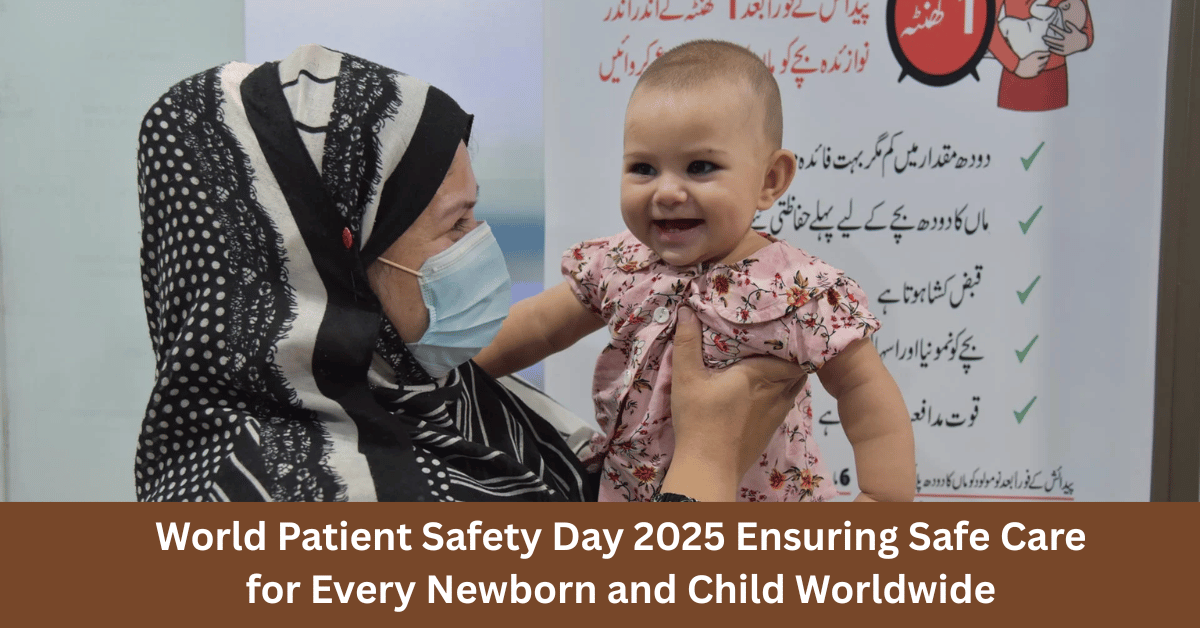Every year, World Patient Safety Day reminds us of the importance of safe healthcare practices. This special day highlights patient safety and encourages everyone to work towards reducing risks in medical care. For 2025, the World Health Organization (WHO) focuses on newborns and children, emphasizing the need for safe care during these vulnerable early years.
Newborns and children require extra attention because their bodies and immune systems are still developing. The WHO call-to-action on this day aims to improve healthcare services and protect young lives everywhere. Let’s understand why this day matters and how safe care can make a difference.
What is World Patient Safety Day?
World Patient Safety Day is observed annually on September 17th. It was established by the World Health Organization to raise global awareness about patient safety issues. The day promotes best practices and encourages governments, health workers, and communities to take action toward safer healthcare for all.
This day is especially important in countries like India, where millions of children receive healthcare services every year. By focusing on patient safety, we can prevent mistakes, reduce harm, and save lives. Health is a right, and safe medical care is part of that right.
Why Focus on Newborns and Children in 2025?
Newborns and children are among the most vulnerable groups in healthcare. They are at higher risk of infections, medication errors, and other safety issues. Many health problems in early life can affect their long-term development and wellbeing.
The WHO’s theme for 2025 highlights the need to provide safe care tailored to the unique needs of babies and children. By improving hospital practices, training healthcare workers, and involving families, we can create a safer environment for young patients. Protecting children from harm during medical care is an investment in their future.
Common Patient Safety Issues for Newborns and Children
Some common safety challenges in paediatric care include wrong medication doses, infections acquired in hospitals, delays in diagnosis, and communication gaps between health workers and families. These problems can lead to complications, longer hospital stays, or even preventable deaths.
In India, where healthcare resources can be limited, focusing on safe and quality care is vital. Awareness programs, guidelines, and monitoring can help reduce these risks. Families also play an important role in asking questions and understanding the care process.
How Healthcare Providers Can Improve Safety
Healthcare professionals can improve safety by following strict hygiene practices, double-checking medication doses, and using standardized protocols in neonatal and paediatric wards. Training and continuous education ensure staff stay updated on best practices.
Encouraging teamwork within hospitals and clear communication with parents creates a supportive environment. It is important for healthcare teams to listen, involve families in decisions, and provide clear instructions for home care after discharge.
Role of Families and Communities in Patient Safety
Families are the first caregivers and can help prevent safety issues by being well-informed about their child’s health. Asking questions, understanding treatment plans, and following doctors’ advice carefully can make a big difference.
Community awareness programs can educate parents about newborn care, vaccination schedules, and warning signs of illness. When communities support safe healthcare practices, more children stay healthy and avoid complications.
Global Efforts to Promote Child Patient Safety
WHO and partner organizations work globally to develop safety guidelines, share research, and support countries in implementing effective patient safety programs. International collaboration helps spread successful ideas and improve care systems everywhere.
Events on World Patient Safety Day bring attention to new challenges and innovative solutions. These efforts encourage governments to invest in safe care infrastructure and policies that protect the youngest patients.
How Young Readers Can Make a Difference
Youth can play an important role in spreading awareness about patient safety. Learning about health rights, supporting friends and family during medical visits, and sharing safety messages on social media can help create safer healthcare environments.
Understanding the importance of hygiene, vaccination, and timely medical care helps young people grow into informed adults who value patient safety. Together, younger generations can push for better healthcare systems that prioritize safety and compassion.
Conclusion: Safe Care is a Right for Every Child
World Patient Safety Day 2025 reminds us that every newborn and child deserves safe, quality healthcare. By following WHO calls to action, we can reduce risks and protect the lives of millions of young patients worldwide. In India and beyond, safe care starts with awareness, education, and teamwork among providers, families, and communities.




